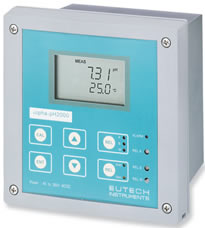Join Our Newsletter
Receive the latest news on new promotions, exclusive offers, and new arrivals.
Your cart is currently empty.
pH 2000 Advance 1/2 DIN pH/ORP PI Controller
| Receive the most efficient use of costly chemicals and reagents with the advanced control functions of the pH 2000 PI controller. This controller offers sophisticated operating features in a rugged housing suitable for wall, panel or pipe mounting. Select from several control types: on/off control, proportional pulse length, proportional pulse frequency or PI (proportional integral) control. Proportional integral control lets you fine-tune controller to prevent overshoot and provide tight control. |
 |
Controller features two-point pH calibration with automatic or manual buffer recognition of a wide range of buffer sets. Select asymmetrical input for standard applications symmetrical input for applications with high electrical noise. |
|
| Control Features:
Advanced Functions:
Physical Features:
|
Copyright © 2024 APT Instruments. Powered by Miva